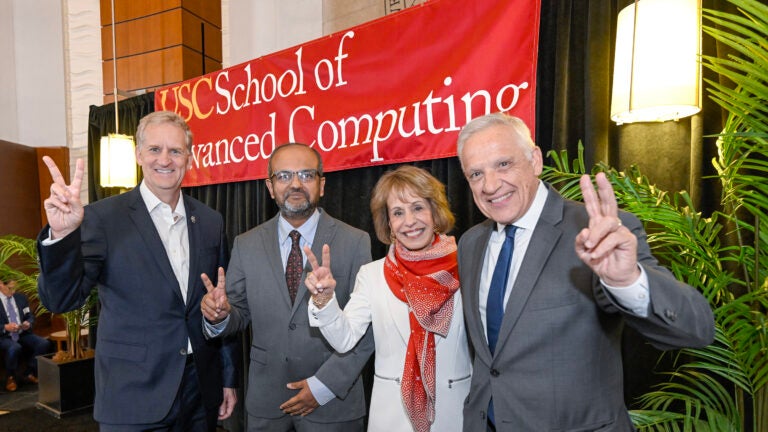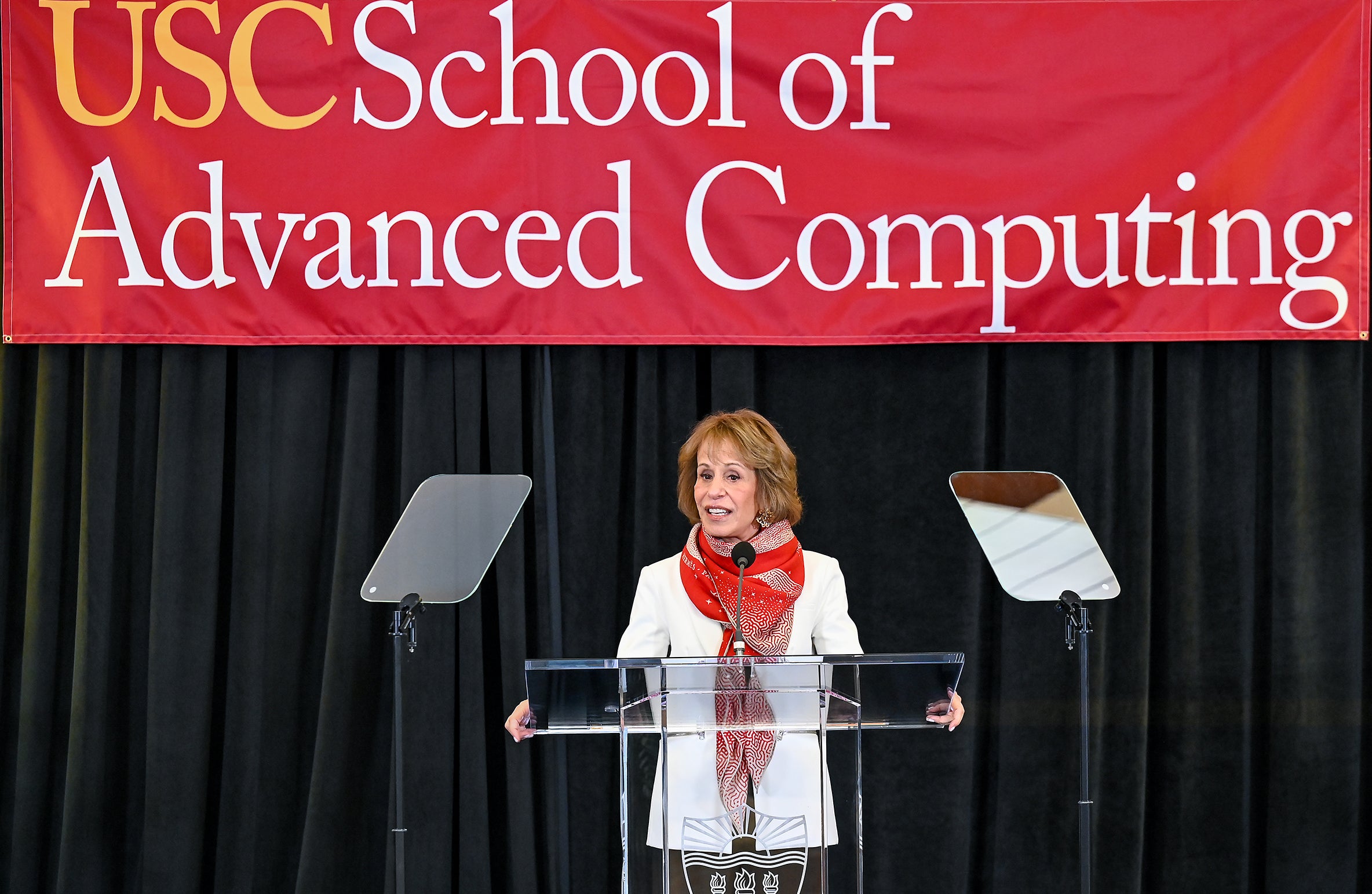
Provost Andrew T. Guzman, Gaurav Sukhatme, USC President Carol Folt and USC Viterbi Dean Yannis C. Yortsos, from left, celebrate Sukhatme’s installation as director of the new USC School of Advanced Computing. (USC Photo/Gus Ruelas)
‘A powerhouse director for a powerhouse school’: USC celebrates inauguration of School of Advanced Computing director
Professor Gaurav Sukhatme, “a thoughtful and responsible innovator,” was installed as the inaugural director of the university’s 23rd school during a Wednesday ceremony on the University Park Campus.
Gaurav Sukhatme, professor of computer science and electrical and computer engineering, was formally appointed by USC President Carol Folt as the inaugural director of the USC School of Advanced Computing on Wednesday.
Stepping up to the podium to resounding applause from the audience filling the Ronald Tutor Campus Center rotunda, Sukhatme, executive vice dean of the USC Viterbi School of Engineering, said he was “lost for words” before thanking Folt for her faith in him. “I am both honored and touched,” he said.
In separate speeches, both Folt and USC Viterbi Dean Yannis C. Yortsos expressed their confidence in Sukhatme’s ability to serve as a leader of the university’s 23rd school. “For a powerhouse school, we needed a powerhouse director,” Folt said. “We found that in Gaurav.”
The new school, which was officially announced last week, is a keystone of Folt’s Frontiers of Computing “moonshot,” serving as a nexus for advanced computing research and education across the university.
In fall 2023, Folt jumpstarted the initiative with a university gift of $260 million from the Lord Foundation of California aimed at advancing and expanding computing research and education across the university.
“Our achievements in engineering and computation have already changed the world in so many ways,” Folt said. “I like to say that USC knows how to move fast when it is needed most. And that’s what we’re seeing and celebrating today.”
A digital backbone
The new school, a unit of USC Viterbi, will be home to the Thomas Lord Department of Computer Science, the Ming Hsieh Department of Electrical and Computer Engineering, and the Division of Computing Education, but “faculty across all schools will be involved in creating this digital backbone,” Folt said.
Students are at the heart of the initiative, which Folt said aims to provide knowledge of advanced computing to all, regardless of discipline.
“The jobs of the future will require digital skills and computer literacy,” she said. “Our moonshot, when fully implemented, is determined to ensure that every single student will be prepared to be a part of creating the world of the future.”

Describing Sukhatme as a “true multihyphenate” with a “multidisciplinary mind,” Folt praised his academic accomplishments and leadership acumen, acknowledging his scholarly work’s whopping 39,000 citations and his numerous leadership roles at the university.
He also embodies the philosophy of putting students first, she said, highlighting his mentorship of more than 45 doctoral students and 100 master’s and undergraduate students during his academic career at USC.
A long and storied Trojan journey
The inauguration also served as an opportunity to celebrate Sukhatme’s long and storied Trojan journey.
Sukhatme is a double USC Viterbi alumnus, having earned his master’s degree and doctorate in computer science at USC. He was mentored by Professor Emeritus George Bekey, a renowned pioneer in robotic and technology ethics.
Sukhatme became a professor in 2000 and chaired USC’s department of computer science from 2012 to 2017 during one of its fastest periods of growth. Since 2017, he has served as the executive vice dean of USC Viterbi.
In 2023, at the Thomas Lord Department of Computer Science naming ceremony, he received the Donald M. Alstadt Chair in Advanced Computing. “Some people may think of this as a capstone, but for Gaurav, it was just another milestone that brings us here today,” Folt said.
In closing, Folt reflected on the similarities between cricket, Sukhatme’s favorite sport, and computer science, his intellectual passion.
“They both require strategic planning by people to succeed and … enormous patience,” said Folt. “While things in computing can move quickly — like current advances in AI — patience is key, especially given the ethical issues at stake.”
Before handing the podium to Sukhatme, Folt thanked Yortsos and Geoffrey Garrett, dean of the USC Marshall School of Business. “You’ve been real partners from the start,” she said. “It has been such a great opportunity to work with you.”
A full-stack approach
During his address, Sukhatme pledged to move forward USC’s rich academic and interdisciplinary legacy with, to use a computer science term, a “full-stack approach,” building on the university’s “long-standing and well-acknowledged strengths across all our schools.”
“We seek to build a community of scholars dedicated to expanding the frontiers of computing not only in computer science, electrical engineering and other engineering disciplines, but also in the sciences and mathematics,” Sukhatme said.
“The work of our faculty [at the USC School of Advanced Computing] will profoundly impact virtually every field, from medicine and the health professions to law, business, communications, the arts and humanities.”
Speaking to the assembled crowd of trustees, deans, faculty, staff and students, he outlined his “unwavering commitment” to innovation in computing across all facets of USC, encouraging diverse collaboration and thought, and fostering academic excellence and inclusivity.
“I want to emphasize that while the School of Advanced Computing will operate as a unit within the Viterbi School of Engineering, it is a school for everyone,” Sukhatme said. “It will be home to innovative new programs in computing to ensure that every USC student learns about the explosive modern advances in machine learning and artificial intelligence, while developing a grounding in the fundamentals of computing that underpin these technologies and their applications.”
With the opening of the new Dr. Allen and Charlotte Ginsburg Human-Centered Computation Hall this summer, a new home for the School of Advanced Computing, Sukhatme affirmed the emphasis on “scholarship with impact” at USC.
“Our work will be firmly rooted in solving important societal problems that address issues of sustainability, global health, society and governance, and many others,” he said.
Sukhatme concluded by offering his “deepest gratitude” to Yortsos for his “remarkable stewardship for nearly two decades.”
A truly remarkable vision
For his part, Yortsos, during the ceremony’s closing speech, said he didn’t have to look far to find the perfect leader to entrust with this initiative’s “extraordinary genesis.”
“When I was asked who would be the ideal person to run the new school, help it stand, take its first steps and grow to adulthood, I knew that the right person was next to me: Gaurav Sukhatme,” he said.
Yortsos said he envisions the new school as “a trusted, indivisible and quintessential part of the entire university. A school of advanced computing for all.”
Paraphrasing economist W. Brian Arthur, he said: Technology is leveraging phenomena for useful purposes. “These … words encapsulate all that we do.”
The phenomena may vary, he said, from the physical, chemical, geological, biological and planetary, to the behavioral and social.
The “useful purposes” can address grand challenges and moonshots, “but what leverages these phenomena, and the reason we are here today, is advanced computing,” Yortsos said. “This is, then, the mission of our new school: to leverage phenomena using advanced computing.”
That mission, he added, will include “the solution of vexing problems in sustainability, health, security; enriching life; and the pruning and ultimate elimination of unavoidable unintended consequences that challenge our ethics and our humanity.”
In closing, Yortsos delivered this message to Sukhatme, his friend and colleague of more than 20 years:
“I am thrilled to have the opportunity to also usher in this historic moment for the entire university and to congratulate and celebrate our remarkable colleague, who is entrusted with carrying forward a truly remarkable vision.”



